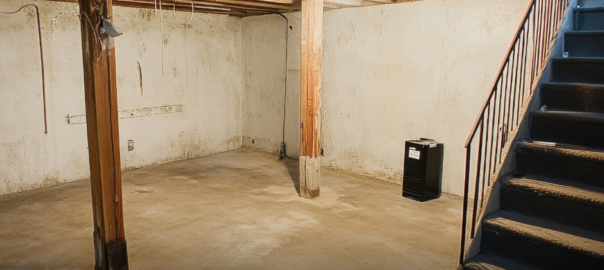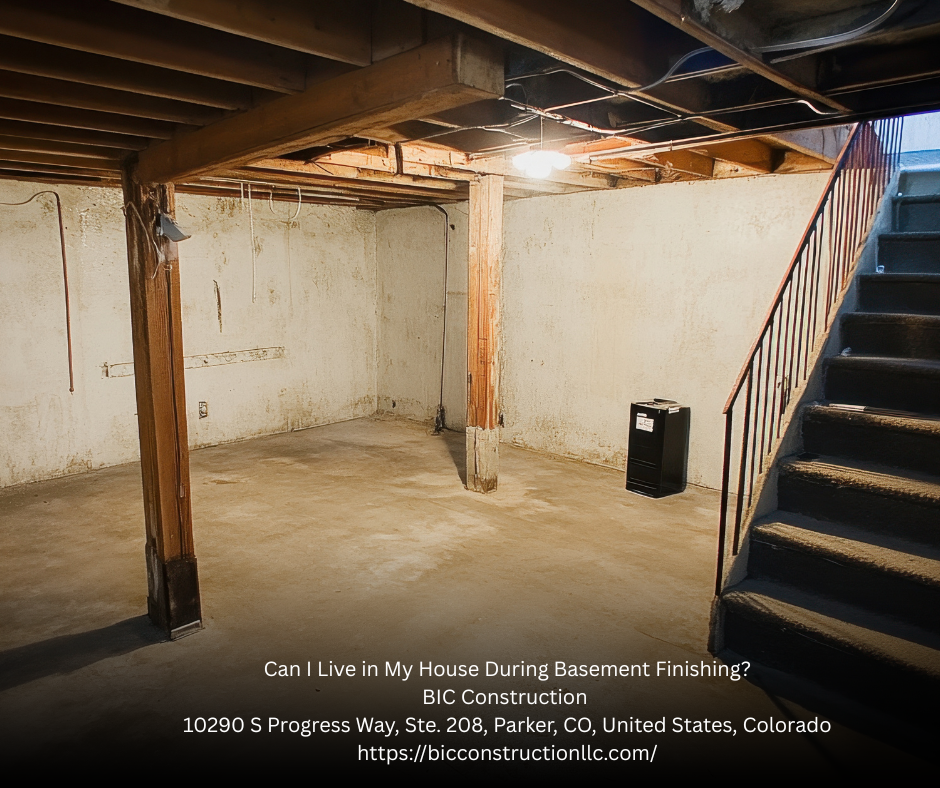Yes, you can live in your house during basement finishing, but it takes careful planning. Expect noise and dust, which can disrupt your daily life and impact air quality. You’ll also need to manage safety concerns, like keeping children and pets away from work areas.
If you’re working with professionals who offer basement finishing services, ask them about their process and how they manage disruptions for families who stay on-site.
Consider whether temporary relocation might make things easier. Communicating with your contractors about schedules can help ease the process. Discover more tips to make your renovation smoother as you continue.
Assessing the Scope of Your Basement Finishing Project
Before diving into your basement finishing project, it’s essential to thoroughly assess its scope to guarantee everything runs smoothly.
Start by determining what you want to achieve—whether it’s a cozy family room, a guest suite, or a home office.
Next, evaluate the existing conditions. Check for moisture issues, structural concerns, and electrical or plumbing needs. This assessment will help you identify necessary repairs before you begin any cosmetic work.
Consider how much time and budget you can allocate, as this will influence your design choices and contractor selection.
Finally, outline a timeline for completion, factoring in any potential interruptions.
The Impact of Noise and Dust
While you’re transforming your basement into a functional space, it’s crucial to understand how noise and dust can affect your daily life.
Construction noise from tools and machinery can be disruptive, making it difficult to concentrate or relax. If you work from home or have children, this might create challenges in your routine.
Dust is another concern. It can spread throughout your living areas, affecting air quality and causing allergy issues.
You’ll want to take precautions, like sealing doors or using air purifiers, to minimize its impact.
Being aware of these factors helps you prepare for the temporary inconvenience, ensuring you can still maintain some level of comfort and productivity during the renovation process.
Evaluating Safety Concerns During Renovation
As you begin your basement finishing project, it’s vital to evaluate safety concerns to protect yourself and your family.
- Start by identifying potential hazards like exposed wires, sharp tools, or heavy materials that could cause injuries.
- Ascertain your work area has proper ventilation, especially if you’re using paint or adhesives that emit fumes.
- Consider the presence of mold or asbestos, particularly in older homes; it’s wise to test for these before starting renovations.
- Keep children and pets away from the construction zone to avoid accidents.
- Make sure you have fire extinguishers accessible, and guarantee that all emergency exits remain clear and functional throughout the project.
Prioritizing these safety measures will help create a secure environment during your renovations.
Considering Temporary Relocation Options
When considering whether to relocate during your basement finishing project, think about the costs involved and how long the work might take.
Temporary relocation can provide you with peace and comfort, but it can also strain your budget.
Weighing these factors will help you make the best decision for your situation.
Cost of Relocation
Before relocating during a basement renovation, consider all related costs. Renting a short-term place like an apartment or hotel includes rent, utilities, and possible extra fees. Staying with friends or family may save money but could come with its own trade-offs.
Don’t forget to include moving and storage costs for your belongings, especially if you’re clearing out large areas. If the new place is far, gas or public transport costs can also add up.
Compare these expenses with the benefit of escaping the mess and stress of home construction to decide what makes the most sense.
Duration of Project
How long your basement project will take plays a big role in deciding whether to relocate. For short renovations, staying home may be fine. But if it lasts several weeks or more, the noise, dust, and limited space could become overwhelming.
Ask your contractor for a realistic timeline and consider how much disruption you can tolerate. A short-term move may offer more comfort and fewer daily frustrations. Options like staying with family or renting nearby can ease the strain.
Balance your comfort with your need to stay close to the project and make the best call for your situation.
Managing Daily Life Amidst Construction
How do you maintain your sanity while living in a house under construction? Start by setting clear boundaries. Designate areas of your home that are off-limits to workers and make sure everyone knows where they can and can’t go.
Keep your daily routine as consistent as possible. Establish a quiet space for relaxation or work, away from the noise and chaos. Communication is key—talk to your contractors about schedules and potential disruptions.
Keep essential items organized and accessible to minimize frustration. It’s also helpful to prepare meals in advance to avoid the hassle of cooking in a messy environment.
Finally, find moments to escape, whether it’s a walk outside or a coffee break at a nearby café.
Budgeting for Potential Living Expenses
Living amid construction can be financially taxing, so planning for potential living expenses is essential.
You’ll want to set aside a budget to cover unexpected costs that can arise during this time. Consider the following expenses as you plan:
- Increased utility bills: Construction often leads to higher electricity and water usage.
- Temporary housing: If noise or dust becomes overwhelming, you might need to stay somewhere else for a while.
- Food costs: Cooking at home may not be feasible, so factor in takeout or dining out more frequently.
- Cleanup supplies: You may need additional cleaning products to manage dust and debris.
Communicating With Your Contractors
Effective communication with your contractors is essential to guaranteeing your basement finishing project runs smoothly.
Start by setting clear expectations about timelines, budgets, and design choices. Regular check-ins can help address any concerns before they escalate. Don’t hesitate to ask questions; clarity is vital for both you and your contractors.
Use email or a messaging app for quick updates and documentation, but also schedule face-to-face meetings for more complex discussions. Make certain to voice any changes or issues promptly, and be open to their professional advice.
Frequently Asked Questions
How Long Will the Basement Finishing Project Take?
On average, basement finishing takes about 4 to 8 weeks. Factors like size, design, and contractor efficiency can influence this timeline. You’ll want to plan accordingly for any potential delays during the process.
Will I Need Permits for Basement Finishing?
You’ll likely need permits for basement finishing, as most local regulations require them for structural changes. Check your city’s codes to guarantee you’re compliant, and avoid potential fines or costly delays during your project.
Can I Use My Basement as a Workspace During Renovations?
You can use your basement as a workspace during renovations, but it’s crucial to guarantee safety and minimize distractions. Make sure the area’s well-ventilated and consider potential noise from construction activities around you.
How Can I Minimize Stress During the Renovation Process?
To minimize stress during renovations, create a clear plan, set realistic timelines, and communicate openly with your contractors. Keep your living space organized, designate a quiet area, and take breaks to recharge. You’ve got this!


